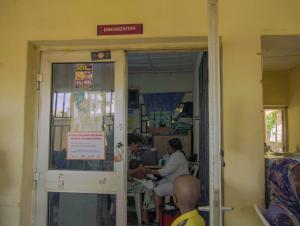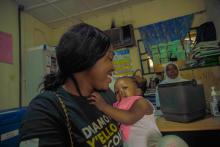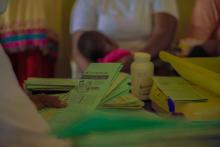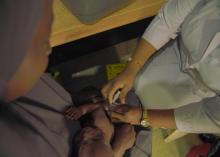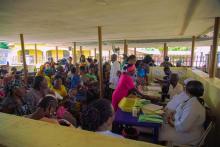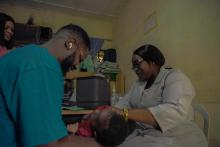Raising a healthier generation with lifesaving vaccines
Abuja, 22 May, 2023 - At least 64% of children ages 12 to 23 months in Nigeria failed to receive all recommended vaccines by the National Expanded Programme on Immunization (EPI) in the last five years, from the 2021 Multiple Indicator Cluster Survey (MICS) and National Immunization Coverage Survey (NICS).
The development is increasing the risk of outbreaks and child mortality due to vaccine-preventable diseases.
Immunization is one of the most cost-effective proven tools for controlling and eliminating life-threatening infectious diseases and is estimated to avert about three million deaths every year.
To combat vaccine-preventable childhood killer diseases, the World Health Organization (WHO) recommends Routine immunization (RI) for all children and appropriate vaccination through the life course.
Current vaccines for routine childhood vaccination in Nigeria protect children against tuberculosis, hepatitis B, Polio, diphtheria, pertussis, tetanus, Haemophilus influenza type b, pneumococcal disease, rotavirus, measles Yellow fever and meningitis.
The Government of Nigeria, in collaboration with WHO, with funding from GAVI, Bill and Melinda Gates Foundation (BMGF) and other partners, have been implementing free routine immunization programmes across public health facilities in the country.
At Kuje General Hospital, Kuje Area Council, Abuja, the immunization clinic operates Mondays to Fridays and administers all recommended antigens for all children under two years
For a caregiver like Mrs Edna Lawrence, her 9-month-old daughter (Ose) has not missed any of her vaccination schedules. Ose was at the clinic to receive the measles, Yellow fever and vitamin A antigens.
“I want her strong and healthy. I know vaccines can keep her safe from many diseases like tuberculosis, polio and many diseases.
On vaccination days, I ask for permission from my office to take my daughter to the clinic to receive her shot.
They have been very supportive and that has made it possible for her not to miss any vaccine on he schedule. I use this health facility because they always have all the routine antigens and it is close to my home,” she says.
The RI programme is to avail caregivers’ opportunity to present their children to the nearest health facility to receive all scheduled childhood vaccines starting from birth to 2 years.
Despite the existing immunization programme, the number of children that have never received any vaccine (zero doses) or are not fully vaccinated remains high, due to various factors.
Causes for low immunization include fear of side reactions, lack of knowledge or information on immunization, service delivery issues, mistrust, and distance to immunization sites, among others.
For instance, Mrs Seifa Adams almost made her first child skip the second schedule of antigens (Oral polio Vaccine (OPV), Pneumococcal conjugate vaccine (PCV), the Pentavalent vaccine (Diphtheria, Pertussis, Tetanus, Hepatitis B and Hib)) because of wrong advice from a neighbour.
Luckily, Mrs Seifa did not follow the advice for her children to miss any of the vaccines because her husband insisted, she follows the advice given by health workers during antenatal and immunization services.
“In 2020, I almost skipped my son’s immunization schedule because my neighbour said her children did not receive those vaccines.
My neighbour has three children. She advised that her co-wives warned her against some vaccines because of the side effects on the children. Now I know better and my children have not been falling sick like hers,” she says.
“To prevent misinformation or missed vaccination or zero dose cases, we usually give health talks to pregnant women and caregivers during anti-natal and immunization days, explains Fesobi Oluwabunmi, the head nurse at Kuje General Hospital.
Nurse Fesobi explains that they keep immunization records of children receiving vaccines in the facility and follow up with the caregivers when the children miss their schedule.
“We call them and sometimes go find them with the antigen and vaccinate the children in their homes. The reasons they give for missing schedules are financial constraints, not having time to leave work or that they travelled”.
Just like Mrs Adam’s husband, Mr Olajide Adiodun, a businessman ensures his children do not skip any of the routine vaccines.
In the case of Mr Adiodun, he creates time within his busy schedule to follow his wife to the clinic for the vaccination of his children.
“I follow them to the clinic on their immunization days. It is the duty of everyone - not just mothers and health workers - to make sure all children are fully vaccinated.
I commend the government, WHO and other partners for providing free vaccines. It relieves a huge financial burden on parents and allows the less privileged to benefit from the lifesaving services”, he explains.
With WHO celebrating its 75th anniversary in improving public health, making progress towards health equity requires understanding where there are gaps in access or uptake of vaccines, why those gaps exist and what can be done to address them.
The WHO Country Representative, Dr Walter Kazadi Mulombo underscores the importance of vaccination, saying WHO will continue to provide technical support to the government of Nigeria to ensure catch up vaccination efforts are achieved and no one is left behind from the full benefit of vaccines.
According to him, vaccination should continue to remain top on the national agenda for Nigeria and as part of the broader PHC revitalization effort to achieve Universal Health coverage.
Additionally, WHO is providing technical support to the government in its effort to introduce new vaccines and other strategies such as the optimized outreach strategy and the RI intensification, aimed at implementing essential immunization recovery plans to restore and strengthen immunization and primary health care.
Technical Contacts:
Dr Kofi Boateng; Email: boatengko [at] who.int (boatengko[at]who[dot]int)
Dr Koko Ipuragboma Richard; Email: kokor [at] who.int (kokor[at]who[dot]int)



